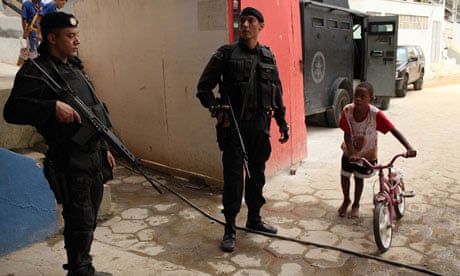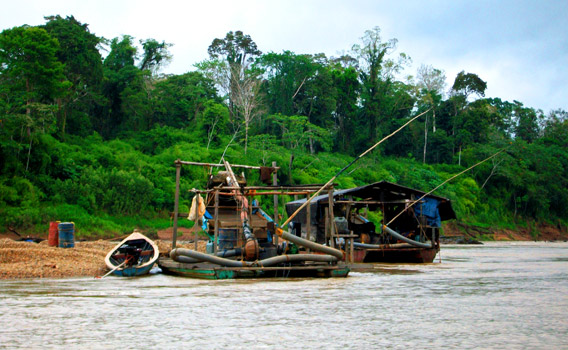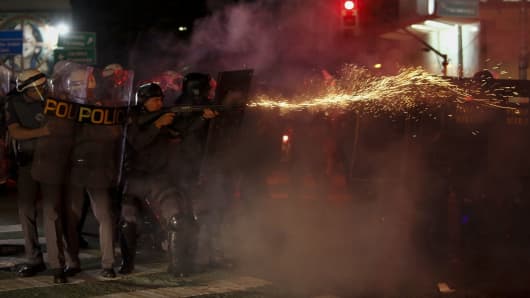Leaked secret audio recordings of Brazil’s most powerful figures have sparked a series of explosive scandals in the nation’s ongoing political crisis. Now, Brazilian lawmakers are trying to outlaw publication of such recordings.
A bill, which has been idling since last year in the Câmara dos Deputados, Brazil’s lower house of Congress, has picked up new steam this month. The proposed legislation seeks to criminalize the “filming, photographing or capturing of a person’s voice, without authorization or lawful ends,” punishable by up to two years imprisonment and a fine. If the recording is published on social media, the penalty rises to four to six years.
When it was originally introduced, the bill was criticized as one of many proposed draconian measures designed to protect politicians and a direct threat to freedom of expression and the press.
The anti-recording bill was introduced in 2015 by Deputado Veneziano Vital do Rêgo, of interim President Michel Temer’s increasingly right-leaning PMDB party. Rêgo, who voted for the impeachment of now suspended Brazilian President Dilma Rousseff, has reason to fear being secretly taped: He is a suspect in 35 pending investigations for various financial and administrative crimes, as of April, according to Transparência Brasil, a leading anti-corruption watchdog, and the fact-checking website Agência Lupa.
The Institute for Technology and Society of Rio de Janeiro, which called the bill “troubling” and “unbelievable,” said the law would criminalize such everyday activities as filming a birthday party and posting it on social media. On Medium, the institute wrote that the bill “prevents journalistic and investigative activities of great significance and endangers anyone who performs audiovisual activities. It is an unconstitutional bill, which violates the freedom of expression and other constitutional principles such as the right to information and prerogatives of the media.”
The bill would not block the federal police’s use of secret recordings, but would prohibit any recording — secret or open — conducted without full consent and not produced in “the public interest,” a subjective term that would likely be left to the discretion of judges.
This week, leaked recordings revealed the president of Association Magistrates of Paraná state secretly coordinating retaliatory legal actions against journalists who reported on judges’ inflated wages. Brazilian courts have also ordered Marcelo Auler, an independent journalist, to take down 10 articles reporting on leaks and illegal wire taps related to Operation Car Wash, the ongoing corruption probe, and banned him from publishing any future reporting on the subjects.
Brazil Might Have 7 Former Presidents with Police Issues
Yesterday, it was made public that Brazil’s Prosecutor-General asked the Supreme Court for the arrest of high-profile members of the Brazilian Democratic Movement Party (PMDB, the same of acting President Michel Temer). Senate President Renan Calheiros, Senator Romero Jucá, and former President José Sarney are all accused of conspiring to tamper with Operation Car Wash, an ongoing anti-corruption investigation.
For Sarney, an 86-year-old man who served as President in the 1980s, the Prosecutor-General asked for a house arrest and the wearing of a tracking device on his ankle. The former President released a statement saying that, after 60 years as a public man, he deserved more respect from the Prosecutor-General – whatever that means.
But this wouldn’t be the first time a president has been arrested in Brazil. Six other presidents have been forcefully taken by the police, either during or after their time as the head of state; some were victims of authoritarian regimes. The most recent incident involves Lula da Silva, who was temporarily detained by police this past March. Here’s a recap of these run-ins: ...
Brazil Police Accuse Samarco of Paving Way for Dam Disaster
Brazil's mining company Samarco, a joint venture between Vale SA and BHP Billiton, has been accused of cutting safety spending in favor of production in relation to a deadly dam burst last November, the country’s federal police said Thursday as part of an investigation.
Police said Samarco had skimmed on safety spending, focusing instead on increasing production despite obvious indications, such as cracks, that the dam was in danger of a breach.
As well as Samarco, police accused Vale of misconduct because it deposited its own mining waste in the dam, and VogBR, the service company that checked the safety of the dam. Eight executives were also accused, although their names were not disclosed by the police.
As a result of the collapse a village was destroyed, killing 19 people, drinking water supplies for hundreds of thousands of people were interrupted and damage extended right up to the mouth of a river on the Atlantic coast, with wildlife, tourism businesses and fishing communities all suffering.
Brazil's Fundao dam collapse: The silence after the mud
... There was time. There was time to evacuate everyone, had only the warning come
... The enormous wave from the Fundao dam flowed along this same route, devastating aquatic life in the river. Fishermen lost their livelihood, and farmers lost their irrigation source and livestock. The drinking water of millions of people was contaminated, and more than 900 hectares of soil was covered in toxic sludge.
The mud's voyage down the river took 16 days, and the concerns of the inhabitants of the towns and cities along its banks grew day by day. According to many, and confirmed by a Samarco official who declined a formal interview, no information was given about what contaminants were present in the water, nor were instructions on how to respond to the disaster issued.
Almost as a warning of what was to come, dead fish came floating down the river.
"We heard about how the mud was about to flow down the Rio Doce," recalls Luciano de Bem Magalias, director for SAAS, a water a sewage company in Baixo Guandu, a village more than 400 kilometres away from the dam collapse.
"The first thing we saw was tonnes of dead fish flowing past us … and a stink of rotten mud and dead animals," he says.
During a press conference in November, Samarco reassured the residents that the waste floating down the river did not constitute any danger to humans - a point disproved later by an analysis of Baixo Guandu's water that registered arsenic, manganese and other poisonous substances.
"No one would tell us if the water was drinkable," Magalias says, "and everyone here relies on the river."
Brazil judge dismisses $5.7 billion civil suit against Samarco: Vale
Welcome, Olympic Tourists, to Brazil. Please Don’t Mind the Mess
That sewage-filled harbor that visitors will pass on the way from the airport -- and the spot where Olympic sailing events will be staged -- was supposed to be a shimmering, clean bay. That new metro line they’ll take from the posh Ipanema beach neighborhood to the games will at best run on a limited schedule, having started operations just four days before the opening ceremony. And what about the state-of-the-art gear that police were supposed to get to help keep travelers safe? A top official says it never happened.
Welcome to Brazil, a land of political, economic and fiscal crisis.
Brazil federal police raid Olympic site in corruption investigation
Brazilian federal police on Tuesday raided the offices of the consortium responsible for Olympic construction projects at the Deodoro site in northern Rio de Janeiro as part of a major corruption investigation.
Five construction firms are building most of the 39 billion reais (NZ$16.2 billion) worth of venues and infrastructure needed for Rio's Olympics. The figure includes at least 1.76 billion reais (NZ$731.5 million) in federal funds, according to documents from Brazil's federal accounting court.
All five companies are caught up in an investigation into price fixing and political kickbacks at state-run oil company Petrobras. That two-year probe has seen scores of top executives and politicians jailed or charged so far.
Federal prosecutors have in the past said they found evidence of fraud in earth-moving services at the Deodoro venue, which will host Olympic sports such as shooting, equestrian events and the pentathlon.
Federal authorities have already said they are investigating the Porto Maravilha project, an 8-billion-real (NZ$3.33 billion) facelift of Rio's dilapidated port area, and also the expansion of the city's metro line to the Olympic area in Barra.
Trump Towers Rio Is Coming To Porto Maravilha
Mayor Eduardo Paes, Alberto Silva, President of Rio de Janeiro’s Port Area Urban Development Company (Companhia de Desenvolvimento Urbano da Região do Porto do Rio de Janeiro – Cdurp); National Managing Director of Special Investment Funds for Caixa Econômica Federal; and Donald Trump Jr, Executive vice-president of Trump Organization; , announced at a press conference at The Palácio da Cidade, in Rio de Janeiro, the partnership for the development of the largest corporate office complex in Brazil.
Trump Towers Rio will be the first project to bear the Trump brand in Brazil.... We are incredibly excited to announce Trump Towers Rio. Brazil is an extremely important market for us and one that I have been looking forward to entering into. I believe that with the demand for the Trump brand coupled with the unparalled location and highly advanced design, there will be nothing like this in Brazil and beyond — says Donald Trump Jr.
... over 4,000 families were forcibly evicted to make way for constructionSince the beginning of the term of this government, abandoned areas in the city are undergoing rehabilitation – the project “Porto Maravilha” is the best example of that. ... I am certain we are on the right track and this project is a proof of that – highlights Mayor Eduardo Paes.


















